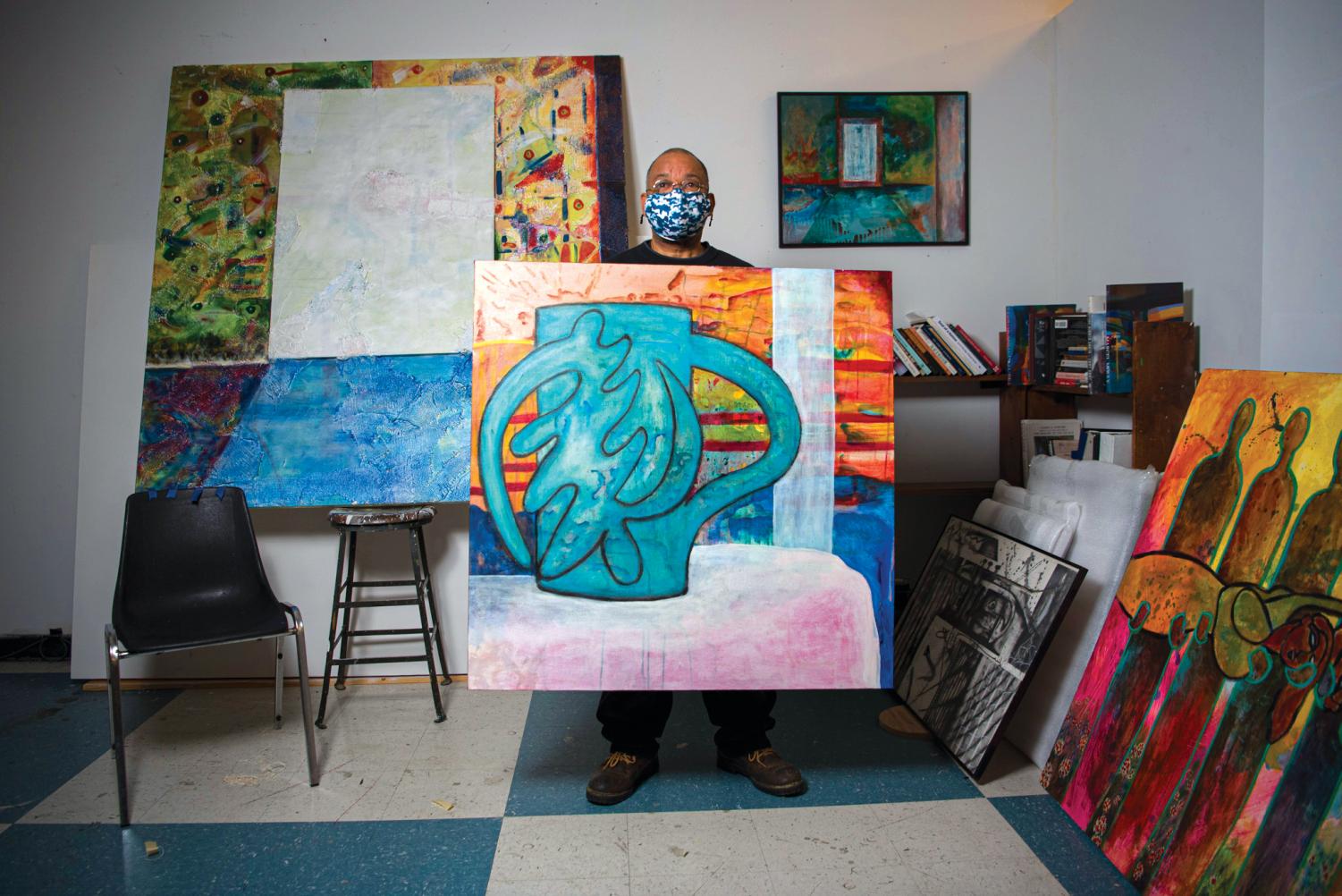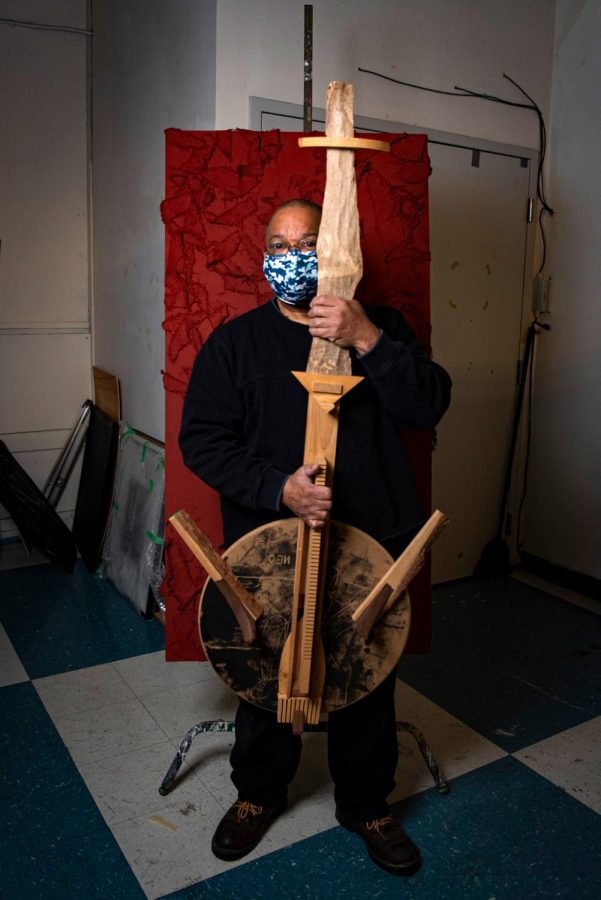Professor went from prison to prestige through art
February 25, 2021
Najjar Abdul-Mussawwir is a professor at the School of Art and Design and Africana Studies at SIU. He is also an active artist that has been recognized in art exhibits and museums across the country, even across the world. But Abdul-Mussawwir did not only find out art was a passion, but it was something that saved him.
Growing up in Chicago in the 1960s, as a kid, Abdul-Mussawwir was bused into primarily white schools.
Advertisement
“They were trying to integrate, mind you. It was supposed to be a period of progress. Which they tried to bring Blacks and whites together, but there was a lot of confrontation,” Abdul-Mussawwir said.
While at school, Abdul-Mussawwir found himself discovering his love for art.
“I remember being in fourth grade and they put out a lot of Crayolas out on a paper. They put black ink on it [the paper] and scratch into it. You could scratch anything you want into it. That blew me away. To me that was high-tech.”
While trying to further his education as he got older, racism from others around him discouraged him.
“I was in a school where the white students and white parents and the white instructors didn’t really want you there. How do you become educated in a system that don’t even want you in that environment?,” Abdul-Mussawwir said.
After rampant racial incidents, he dropped out of high school during his junior year.
After he left school, he was involved in an armed robbery, where he would later be sentenced to 10 years in prison. While in prison, Abdul-Mussawwir met a fellow inmate from a nearby cell that changed his mindset.
Advertisement*
“Mind you he is a stranger. A stranger who was African American, who had an interest in me because he felt I had become subject to a system that didn’t have my best interest at heart,” Abdul-Mussawwir said.
“He said ‘freedom does not get you out of here [prison], that’s not your freedom[…] as a result, it’s your intellect. How you perceive the world. You have to be more serious about analyzing where you’re at.’”
This same inmate encouraged Abdul-Mussawwir to finish his education while in prison.
“I ended up not being in school and when I got in prison, he made me realize that I couldn’t read […] as a result, I read everything I could get my hands on. I read the dictionary several times from front to back. Just to remember words that I had no intention of remembering,” Abdul-Mussawwir said.
This man encouraged Abdul-Mussawwir to study history, science, and philosophy. He also encouraged him to seek out what he loves most- art.
While in prison, Abdul-Mussawwir would use his art not only to express himself or his ideas, but to help other inmates by drawing images for fellow inmates’ family members or by sketching families of inmates.
“It made other prisoners happy. So they could send something to their daughters, grandmother, or father. It was a means for them to send something that really meant something to them. It made them feel better when they could wake up in the morning and look on the wall and see a painting or drawing of their children or a relative or wife or something. It made them feel alive, it made them feel human.” Abdul-Mussawwir said.
After serving nine years and a month, Abdul-Mussawwir was released from prison. He went on to begin his undergraduate studies at SIU, after earning his GED in prison.
A group of professors had been trying to convince him to come to SIU.
“When I met those professors from Southern Illinois University inviting me to come here. And told me that I could be a professor myself […] I said ‘I am Black, I am a Muslim, and I’ve been to prison. Who in the world is going to have any appreciation for me?’ It was stacked up against me,” Abdul-Mussawwir said.
The professors told Abdul-Mussawwir, that if he studied and put in the time, the academic community would embrace him because he had something to offer.
He studied and found a place in the School of Art and Design and later on was asked to teach a course.
Years later, Abdul-Mussawwir continues to teach art at the School of Art and Design, but also became a professor of Africana Studies.
“I feel like I am on top of the mountain. To survive the type of trauma and depreciation by otherness has made me realize that people are willing to struggle real hard to keep it there […] if Africana Studies wasn’t here, a lot of people would be underfed intellectually,” Abdul-Mussawwir said.
“We have been very fortunate to have professors in Africana Studies who really are willing to sacrifice a little of themselves to continue our struggle that has gone on for so long. The respect for my colleagues, that contributes to me wanting to stay here at SIU.”
Staff Photographer Jared Treece can be reached at jtreece@dailyegyptian.com or on Instagram at @bisalo.
To stay up to date with all your southern Illinois news, follow the Daily Egyptian on Facebook and Twitter.
Advertisement





Pat Kelly • Feb 25, 2021 at 3:59 pm
I met Najjar at IBHE-SAC(Illinois Board of Higher Education Student Advisory Committee)over 25 years ago. I believe he was VP of GPSC at the time. I was student body president at College of DuPage. He was instrumental in recruiting me to transfer to SIU. The student repression by SIU administration and ham handed city leadership was in a downward spiral, the effects of which can be seen today. At the end of my first year at SIU I was elected to Student Trustee. I watched, in horror, as these corrupt trustee bankers looted SIU monetarily and morally. Their policies of “The war on fun” crippled SIU. Their misguided attempts to remove the party school image backfired horribly. The fiduciary mismanagement and hostile approach to faculty and adornment of all things athletics has failed utterly. Tuition and fees skyrocketed. The faculty went on strike. Enrollment is in the dumpster. We became a graveyard for ex-chancellors with their tenured faculty position intact upon their firing…still collecting chancellor compensation.
It is time to right this sinking ship. I propose Najjar for President of SIU. I’m sure he would decline-he’s too smart for that. SIU has been getting it’s ass kicked by all elven other public universities in IL. In fact, ALL 48 community colleges in the state have a better enrollment record over the last 25 years.
In the late 70’s early 80’s The country of Jamaica was rife with crime. This imperiled their lifeblood tourism industry. They successfully attacked the problem and advertised to the world with the slogan “Come back to Jamaica your new island home”. It worked for them and it could work for our Communiversity.